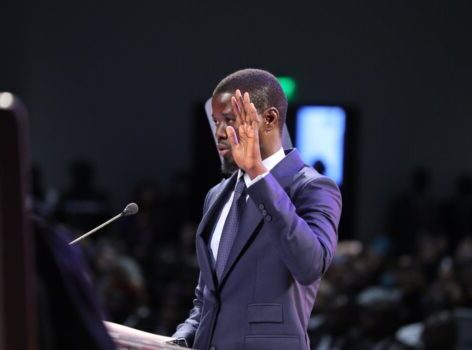 In a historic ceremony on Tuesday, Senegal inaugurated Bassirou Diomaye Faye as its new president, completing an extraordinary journey from prison to the presidential palace for the previously little-known opposition figure.
In a historic ceremony on Tuesday, Senegal inaugurated Bassirou Diomaye Faye as its new president, completing an extraordinary journey from prison to the presidential palace for the previously little-known opposition figure.
Faye’s rise to power unfolded rapidly in recent weeks, propelled by a political amnesty announced by outgoing President Macky Sall. Released from prison less than two weeks before the March 24 election, Faye, a former tax inspector, ascended to elected office for the first time.
“It’s the culmination of a long struggle for democracy and the rule of law,” remarked Aissata Sagna, a 39-year-old factory worker who contributed to Faye’s campaign. “This is a day of celebration for us, even if we have lost young people killed during the demonstrations.”
The election was a crucial test for Senegal’s reputation as a stable democracy in West Africa. Months of unrest, sparked by the arrests of opposition figures like Faye and his mentor Ousmane Sonko, underscored concerns over constitutional term limits and allegations of government overreach. Rights groups reported casualties and arrests amid the protests.
Campaigning on promises to combat corruption and revitalize the economy, Faye’s victory resonated with young people disillusioned with high unemployment and perceived exploitation by former colonial power France.
President Faye pledged to prioritize anti-corruption efforts and economic reform in his inaugural address. With a transparent declaration of assets before the election, including modest holdings and a commitment to transparency, Faye sought to signal a departure from the status quo.
As Senegal awaits the formation of Faye’s government, analysts anticipate scrutiny over its composition and policies, viewing it as a litmus test for the promised break from the past.
Faye’s ascent to the presidency came through the endorsement of Sonko, a popular opposition leader who nominated him to replace him on the ballot after being disqualified due to a prior conviction. While Sonko’s role in the new administration remains uncertain, his influence is expected to endure.
Both Faye and Sonko have faced legal challenges that critics allege were politically motivated. Sonko’s supporters argue that his legal troubles were orchestrated to undermine his candidacy.
Amid the political turbulence, Senegal navigated a contentious electoral process, marked by Sall’s decision to postpone the election briefly in February, triggering renewed protests. However, the constitutional court intervened, ensuring the election proceeded in March.

Biden Withdraws From 2024 Presidential Race, Endorses Kamala Harris
Global Technology Outage Disrupts Key Services Across Multiple Countries
Paul Kagame Wins 99% of Vote In Rwanda’s Presidential Election
Authorities Investigate Shooting At Trump Rally As Assassination Attempt